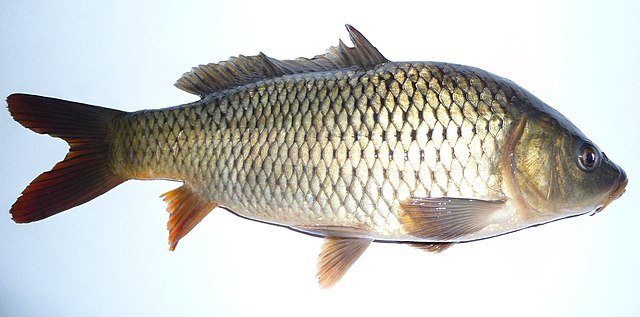
Effectively managing agricultural waste is an opportunity for the aquaculture industry. This study, published in a recent issue of *Scientific Reports*, explores the potential of biochar, a charcoal-like substance derived from organic waste materials, as a sustainable and beneficial supplement for fish feed.
Researchers from Government College University Faisalabad, China Medical University, King Saud University, and the Swedish University of Agricultural Sciences used various biochars (BC) derived from agricultural waste. They fed Cyprinus carpio fish with different diets to investigate their effects on growth, nutrient and mineral digestibility, hematology, and body composition.
The potential of biochar
A promising solution lies in the use of biochar, a charcoal-like material produced from the pyrolysis of organic matter. Biochar has gained attention for its ability to improve soil health, reduce greenhouse gas emissions, and adsorb pollutants. In recent years, researchers have explored its potential as a valuable additive for aquaculture feeds for species like shrimp and tilapia.
Biochar-supplemented feed for carp
In this study, scientists investigated the effects of various biochars derived from agricultural waste on the growth, health, and performance of common carp (Cyprinus carpio). The carp were fed diets supplemented with different types of biochar, including household waste, cotton stalks, corncobs, wheat straw, grass waste, and green waste.
The researchers studied the impact of several biochar sources on the growth, nutrient absorption, and overall health of common carp (Cyprinus carpio). The fish were fed diets containing 2% biochar derived from cotton, wheat straw, corncobs, household waste, green waste, and grass waste, along with a sunflower meal control diet.
The study’s superstar? Corncob biochar (CCBC)! Carp fed diets containing CCBC showed significantly improved growth performance, nutrient digestibility, and body composition compared to the control group.
Here’s why CCBC stands out:
- Improved nutrient absorption: CCBC supplementation resulted in the highest efficiency in mineral absorption, suggesting it helps fish utilize essential minerals more effectively.
- Health improvement: Blood analyses revealed positive changes in fish fed CCBC diets, indicating a possible boost in overall health.
- Sustainable solution: By utilizing agricultural waste products like corncobs, CCBC offers a sustainable and eco-friendly approach to fish feed supplementation.
While other biochar sources showed mixed results, CCBC emerged as the clear winner. Household waste biochar (HWBC) even produced negative effects, highlighting the importance of selecting the right type of biochar to optimize fish health benefits.
Benefits of biochar for aquaculture
This research paves the way for significant advances in sustainable aquaculture. CCBC supplementation offers a promising strategy for:
Stay Always Informed
Join our communities to instantly receive the most important news, reports, and analysis from the aquaculture industry.
- Feed quality improvement: Biochar can enhance the nutritional value of aquaculture feed, providing essential nutrients and improving digestibility.
- Disease risk reduction: Biochar can help reduce the risk of disease in farmed fish by boosting their immune function and reducing harmful microbial activity.
- Better water quality: Biochar can help improve water quality by adsorbing pollutants and reducing nutrient runoff.
Conclusion
The recent study has revealed the significant benefits of incorporating corncob biochar (CCBC) into common carp (Cyprinus carpio) diets. The research found that adding just 2% corncob biochar (CCBC) to a sunflower meal-based diet for common carp (Cyprinus carpio) led to substantial improvements in several key areas:
- Body composition: Fish fed CCBC diets exhibited healthier body composition, with more muscle mass and lower fat content.
- Nutrient digestibility: CCBC improved the fish’s ability to absorb nutrients from their food, leading to better overall nutrition.
- Growth performance: Fish fed CCBC grew faster and more efficiently than those on the control diet.
- Hematology: CCBC supplementation positively impacted the fish’s blood health, indicating improved overall well-being.
- Mineral status: Adding CCBC to the diet improved the fish’s mineral absorption, ensuring they received adequate amounts of essential elements.
While all biochar types tested in the study showed positive effects, corncob biochar was particularly effective. This suggests that the specific type of agricultural waste used to produce biochar may influence its benefits for fish.
The study also highlights the cost-effectiveness of using biochar as a fish feed supplement. By incorporating a relatively small amount of CCBC, fish farmers can significantly improve the health and growth of their common carp without incurring excessive costs.
The results of this study demonstrate the potential of biochar as a sustainable and beneficial additive for aquaculture feeds. By incorporating biochar into fish diets, the industry can improve production efficiency, reduce environmental impacts, and ensure a more sustainable supply of aquatic protein for the future.
Further research is needed to explore the mechanisms behind the positive effects of CCBC. However, this study provides compelling evidence of its potential as a valuable tool for aquaculture professionals.
The open access to the article was funded by the Swedish University of Agricultural Sciences; the study was funded by Researchers Supporting Project Number, King Saud University, Riyadh, Saudi Arabia.
Reference (open access)
Amjad, M., Hussain, S.M., Ali, S. et al. Agro-Waste Biochar Conversion into a Fish Feed Additive: Assessing its Effects on the Health and Performance of Cyprinus carpio. Waste Biomass Valor (2024). https://doi.org/10.1007/s12649-024-02714-x
Editor at the digital magazine AquaHoy. He holds a degree in Aquaculture Biology from the National University of Santa (UNS) and a Master’s degree in Science and Innovation Management from the Polytechnic University of Valencia, with postgraduate diplomas in Business Innovation and Innovation Management. He possesses extensive experience in the aquaculture and fisheries sector, having led the Fisheries Innovation Unit of the National Program for Innovation in Fisheries and Aquaculture (PNIPA). He has served as a senior consultant in technology watch, an innovation project formulator and advisor, and a lecturer at UNS. He is a member of the Peruvian College of Biologists and was recognized by the World Aquaculture Society (WAS) in 2016 for his contribution to aquaculture.







